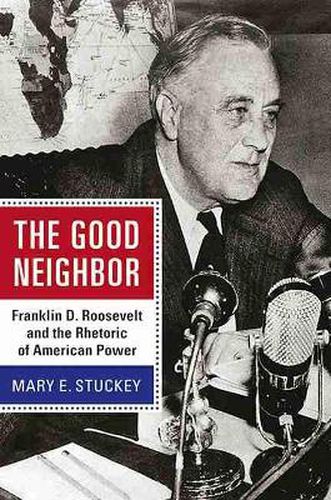Readings Newsletter
Become a Readings Member to make your shopping experience even easier.
Sign in or sign up for free!
You’re not far away from qualifying for FREE standard shipping within Australia
You’ve qualified for FREE standard shipping within Australia
The cart is loading…






No modern president has had as much influence on American national politics as Franklin D. Roosevelt. During FDR’s administration, power shifted from states and localities to the federal government; within the federal government it shifted from Congress to the president; and internationally, it moved from Europe to the United States. All of these changes required significant effort on the part of the president, who triumphed over fierce opposition and succeeded in remaking the American political system in ways that continue to shape our politics today.
Using the metaphor of the good neighbour, Mary E. Stuckey examines the persuasive work that took place to authorise these changes. Through the metaphor, FDR’s administration can be better understood: his emphasis on communal values; the importance of national mobilisation in domestic as well as foreign affairs in defence of those values; his use of what he considered a particularly democratic approach to public communication; his treatment of friends and his delineation of enemies; and finally, the ways in which he used this rhetoric to broaden his neighbourhood from the limits of the United States to encompass the entire world, laying the groundwork for American ideological dominance in the post-World War II era.
$9.00 standard shipping within Australia
FREE standard shipping within Australia for orders over $100.00
Express & International shipping calculated at checkout
No modern president has had as much influence on American national politics as Franklin D. Roosevelt. During FDR’s administration, power shifted from states and localities to the federal government; within the federal government it shifted from Congress to the president; and internationally, it moved from Europe to the United States. All of these changes required significant effort on the part of the president, who triumphed over fierce opposition and succeeded in remaking the American political system in ways that continue to shape our politics today.
Using the metaphor of the good neighbour, Mary E. Stuckey examines the persuasive work that took place to authorise these changes. Through the metaphor, FDR’s administration can be better understood: his emphasis on communal values; the importance of national mobilisation in domestic as well as foreign affairs in defence of those values; his use of what he considered a particularly democratic approach to public communication; his treatment of friends and his delineation of enemies; and finally, the ways in which he used this rhetoric to broaden his neighbourhood from the limits of the United States to encompass the entire world, laying the groundwork for American ideological dominance in the post-World War II era.